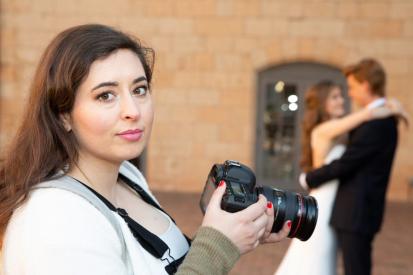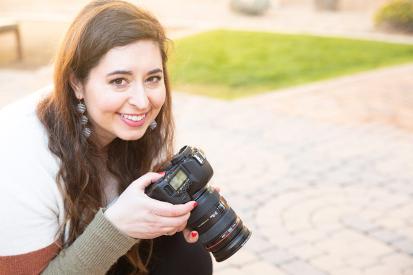Wedding Photographer’s Case Moves Forward After SCOTUS Ruling


Over the past several years, we’ve seen local governments trying to force artists to express messages and promote ideas that violate their beliefs. It’s a disturbing trend that has forced businesses to close, threatened artists with enormous fines, and required individuals to endure years of litigation.
But recently, we’ve seen another trend. These artists are winning in court. That success culminated in June 2023 when the Supreme Court ruled in favor of web designer and graphic artist Lorie Smith and her design studio. In 303 Creative v. Elenis, the Supreme Court reaffirmed the bedrock principle that the government cannot force an artist—or any American—to express messages that contradict their beliefs.
That principle applies to Chelsey Nelson, a photographer and blogger who started a business in Louisville, Kentucky.

Chelsey cares deeply about her clients
When Chelsey Nelson was seven years old, a tornado damaged her family’s home. Thankfully, she and her family survived the devastating storm. Later, they were taken in by a family from their church—and God used this difficult time in Chelsey’s life to create something new.
During the time Chelsey spent living at her church friends’ home, she fell in love with photography and storytelling. She spent hours looking through the family’s photo albums and felt a deep connection to that family through their photos. It was then that she realized the power of photographs to capture meaningful moments in people’s lives.
Today, through her studio, Chelsey Nelson Photography, Chelsey creates photographs and writes blogs to celebrate one of the most meaningful moments of her clients’ lives—their wedding day. She does this for all the couples she works with. She wants every wedding photograph she takes and each blog she writes to tell a unique story about each couple.
Because of this, Chelsey prioritizes building relationships with her clients. She has many conversations with each couple so that she can get to know them. She crafts a timeline for their wedding as they prepare for the big day and then schedules an engagement session to make sure they have some great photos and are comfortable in front of the camera before their wedding day.
Chelsey also enjoys celebrating each couple’s marriage by posting wedding photographs and writing encouraging posts about the couple on her blog.
Chelsey’s personal touch and artistic ability make her photography unique. That’s why she can’t create photos or blogs that express messages that violate her beliefs.
Louisville can’t force Chelsey to violate her beliefs
Chelsey’s beautiful photographs and blogs celebrate the lifelong commitment of marriage between one man and one woman. Chelsey believes every photograph she takes and blog she writes must be consistent with her faith. And since she invests so much personally and artistically into her work, she only participates in and celebrates weddings consistent with her beliefs.
But Louisville interprets one of its laws to force Chelsey to create photographs and blogs that promote same-sex weddings contrary to her religious beliefs about marriage. The law also prohibits her from explaining her reasons for this choice on her own website.
Chelsey serves everyone. But she cannot express all messages.
Under Louisville’s law, Chelsey faced substantial penalties including damages, court orders, and compliance reports if she declined to promote same-sex weddings.
This violated Chelsey’s First Amendment rights. So she decided to challenge the law in court.
303 Creative sets a major precedent for free speech
In 303 Creative v. Elenis, Colorado threatened to compel Lorie Smith to create wedding websites that promoted a view of marriage that violated her religious beliefs about marriage. The Supreme Court held that in doing so, Colorado infringed on Lorie’s First Amendment freedoms. As the Court said, “all persons are free to think and speak as they wish, not as the government demands.” Those same principles protect Chelsey too.
But even before 303 Creative, two different federal court judges held that Louisville’s law violated Chelsey’s freedom of speech by compelling her to promote messages she disagreed with and by restricting her speech on the topic of marriage. As one of those courts put it, the Supreme Court “has long recognized the risk that compelled speech may ‘turn the writer, and every other kind of artist as well, into a minor official, working on themes handed down from above.’”
Louisville appealed the second ruling to the U.S. Court of Appeals for the 6th Circuit. ADF attorneys asked that court to protect Chelsey’s freedom to speak consistent with the High Court’s ruling in 303 Creative. And in April 2024, the 6th Circuit ruled to keep in place a lower court’s injunction preventing Louisville from forcing Chelsey to express messages she disagrees with. The court remanded other aspects of the case to the district court.
Chelsey Nelson Photography v. Louisville-Jefferson County Metro Government
- November 2019: Chelsey Nelson filed a complaint against the city of Louisville.
- February 2020: The United States Department of Justice filed a statement of interest in support of Chelsey, arguing that “[f]orcing Ms. Nelson to create expression and to participate in a ceremony that violates her sincerely held religious beliefs invades her First Amendment rights.”
- August 2020: A federal district court temporarily halted enforcement of Louisville’s law against Chelsey after holding that the law likely violated her freedom of speech.
- August 2022: A federal district court permanently enjoined Louisville from enforcing its law against Chelsey, which allowed her to create messages that align with her religious beliefs about marriage and to publicly promote her views on marriage without the threat of government punishment.
- September 2022: Louisville appealed the decision to the U.S. Court of Appeals for the 6th Circuit.
- September 2022: Chelsey cross-appealed other issues in her case to the 6th Circuit, seeking broader relief to protect her freedom of speech.
- April 2024: The 6th Circuit kept the August 2022 injunction in place and remanded other aspects of the case to the federal district court.
